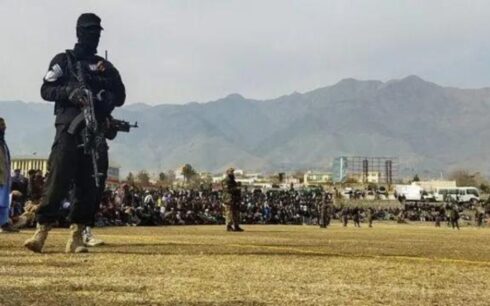Pakistan’s senior military said that safe havens and freedom of action available to Tehreek-e-Taliban Pakistan (TTP) terrorists and other groups in Afghanistan are one of the major reasons impacting Pakistan’s security.
In a statement issued by Pakistan’s Inter-Services Public Relations (ISPR) on Monday evening, the military said Chief of Army Staff (COAS) General Syed Asim Munir presided over the 258th Corps Commanders’ Conference earlier in the day where they discussed in detail the current security situation in the country.
“The sanctuaries and liberty of action available to the terrorists of proscribed TTP and other groups of that ilk in a neighboring country and availability of latest weapons to the terrorists were noted as major reasons impacting the security of Pakistan,” read the statement.
Without actually naming Afghanistan as being the neighboring country, the statement made it clear as to which country it was referring to.

Just two days ago, Pakistan’s Defense Minister Khawaja Asif said the presence of safe havens for terrorists in Afghanistan, particularly the TTP, was a matter of concern. Asif also criticized the decision to allow Afghanistan refugees to settle in Pakistan.
The recent statements by Munir and Asif also reflect Pakistan’s frustration over the lack of cooperation from the Taliban in addressing the TTP issue. Pakistan has communicated its displeasure and warned that the use of Afghanistan territory by the TTP will not go unanswered, reserving the right to respond to safe havens across the border.
However, the Taliban has refuted the claims made by Pakistani authorities.
“We categorically deny these allegations. Pakistan’s internal issues should be addressed within its own borders. Afghan nationals should not be blamed for them. Afghanistan remains committed to preventing its territory from being used against any country, including Pakistan,” stated Zabihullah Mujahid, spokesperson for the Taliban, last week.
At Monday’s forum, participants deliberated in detail on the operational preparedness and training aspects of the army. “Objective training remains the hallmark of our professionalism and we must always remain prepared to guard against any threat to our national security,” the ISPR quoted Gen Munir as saying.
Following two recent attacks in Pakistan that claimed the lives of 12 soldiers, the ISPR said last week it expected the Taliban government to prevent terror groups from using Afghanistan’s soil to plot attacks against any country and to abide by commitments made in the 202 Doha Agreement.
“The involvement of Afghan nationals in acts of terrorism in Pakistan is another important concern that needs to be addressed,” last week’s statement read.
Such attacks are intolerable and would elicit an effective response from the security forces of Pakistan, the ISPR statement added.
Pakistan has witnessed a surge in terrorist attacks following the Taliban’s return to power in August 2021 and has called for decisive action to be taken against terrorists including the TTP.
According to the Pakistan Institute for Conflict and Security Studies, terror activities in the country have soared by 79% during the first half of 2023.
The report, released earlier this month, reveals that a total of 271 militant attacks occurred during the first six months of this year, resulting in the loss of 389 lives. In addition, 656 individuals were wounded.
Comparatively, the same timeframe in 2022 witnessed 151 attacks, causing 293 deaths and 487 injuries. “These figures represent a staggering 79% increase in militant attacks during the first half of this year compared to the corresponding period last year,” the report read.





